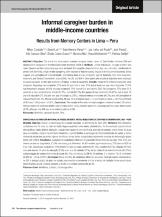Mostrar el registro sencillo del ítem
Informal Caregiver Burden in Middle-income Countries: Results from Memory Centers in Lima – Peru
| dc.contributor.author | Custodio, Nilton | |
| dc.contributor.author | Lira, David | |
| dc.contributor.author | Herrera Perez, Eder | |
| dc.contributor.author | Nuñez del Prado, Liza | |
| dc.contributor.author | Parodi García, José Francisco | |
| dc.contributor.author | Guevara Silva, Erik | |
| dc.contributor.author | Castro Suarez, Sheila | |
| dc.contributor.author | Mar, Marcela | |
| dc.contributor.author | Montesinos, Rosa | |
| dc.contributor.author | Cortijo, Patricia | |
| dc.creator | Guevara Silva, Erik | |
| dc.creator | Castro Suarez, Sheila | |
| dc.creator | Parodi García, José Francisco | |
| dc.creator | Herrera Perez, Eder | |
| dc.date.accessioned | 2016-03-15T14:50:39Z | |
| dc.date.available | 2016-03-15T14:50:39Z | |
| dc.date.issued | 2014-12 | |
| dc.identifier.citation | Custodio N., Lira D., Nuñez L., Parodi J., Guevara E., Castro S., Mar M., Montesinos R., Cortijo P. Informal caregiver burden in middle-income countries: Results from Memory Centers in Lima – Peru. Dement Neuropsychol 2014; 8(4): 376-383 | es |
| dc.identifier.issn | 1980-5764 | |
| dc.identifier.uri | https://hdl.handle.net/20.500.12727/1541 | |
| dc.description.abstract | Objective: The aim of this study was to evaluate caregiver burden based on Zarit Burden Interview (ZBI) and depression in caregivers on the Beck Depression Inventory-II (BDI-II). Methods: Literate individuals, 18 years or older, who spoke Spanish as their native language were included. Demographic characteristics: Age, sex, education, relationship to person with dementia, length of time caregiving, other sources of help for caring, impact on the household economy, family support, and perception of impaired health; and Clinical data on care-recipients: type of dementia, time since diagnosis, treatment, and Global Deterioration Scale (GDS); the ZBI and BDI-II. Descriptive and analytical statistics were employed to assess caregiver burden and predictors of higher burden in caregivers. Results: A total of 92 informal caregivers were evaluated. Regarding care-recipients, 75% were 69 years old or over, 75% had at least one year since diagnosis, 73.9% had Alzheimer’s disease, 84.8% received treatment, 75% scored 5 or over on the GDS. For caregivers, 75% were 55.5 years old or over, predominantly female (81.5%), married (83.7%), the spouse of care-recipients (60.87%), had at least 10 years of education (75.0%) and one year of caregiving (75%), reduced entertainment time (90.2%) and self-perception of impaired health (83.7%). Median score on the ZBI was 37.5 (minimum value = 3; and maximum value = 74). The coefficient of BDI was 1.38 (p-value <0.001). Conclusion: This sample of Peruvian informal caregivers showed elevated ZBI values. Self-perception of worsened health, repercussion on the family economy and time caregiving were the main determinants of ZBI, although only BDI was a consistent predictor of ZBI. | es |
| dc.description.sponsorship | Universidad San Martín de Porres, Facultad de Medicina Humana, Centro de Investigación del Envejecimiento. | es |
| dc.format.extent | pp. 376-383 | es |
| dc.language.iso | eng | es |
| dc.publisher | Dementia & Neuropsycholia | es |
| dc.relation.ispartofseries | Dement Neuropsychol;vol. 8, n. 4 | |
| dc.relation.uri | http://www.demneuropsy.com.br/detalhe_artigo.asp?id=488 | en |
| dc.rights | info:eu-repo/semantics/openAccess | es |
| dc.source | REPOSITORIO ACADÉMICO USMP | es |
| dc.source | Universidad de San Martín de Porres – USMP | es |
| dc.subject | Demencia | es |
| dc.subject | Cuidadores | es |
| dc.subject.ddc | 616.8 - Enfermedades del sistema nervioso y trastornos mentales | es |
| dc.title | Informal Caregiver Burden in Middle-income Countries: Results from Memory Centers in Lima – Peru | es |
| dc.type | info:eu-repo/semantics/article | es |
| thesis.degree.name | Medicina Humana | |
| thesis.degree.grantor | Universidad de San Martín de Porres. Facultad de Medicina Humana | |
| thesis.degree.discipline | Medicina |
Ficheros en el ítem
Este ítem aparece en la(s) siguiente(s) colección(ones)
-
Artículos [274]







